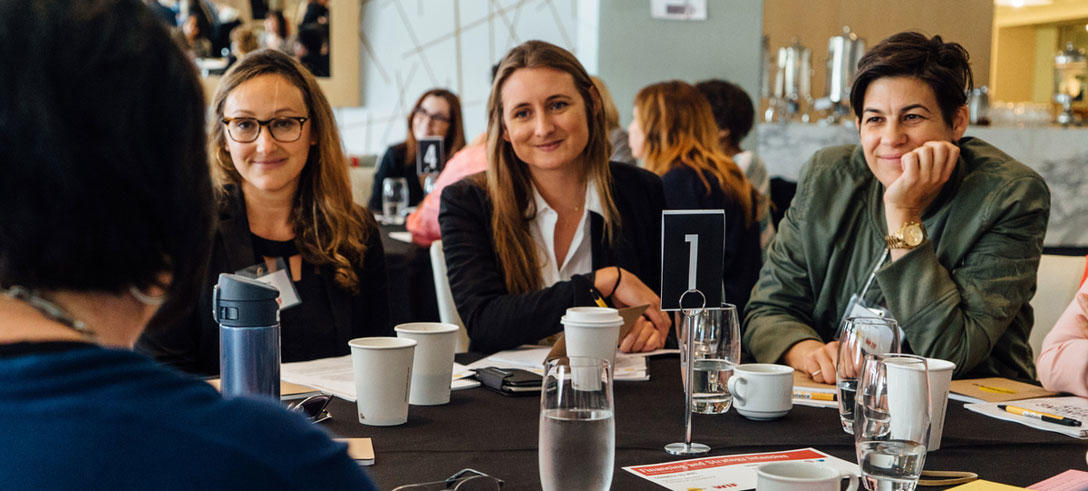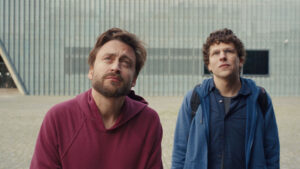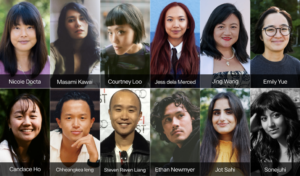Dyana Winkler, Darcy Brislin, and Louise Runge at the 2017 Women’s Financing and Strategy Intensive. © 2017 Sundance Institute | Nick Sammons
Darcy Brislin & Dyana Winkler
Darcy Brislin and Dyana Winkler attended the 2017 Screenwriters Lab as part of the Alfred P. Sloan Fellowship, established to support the development of screenplays with science and/or technology themes. Click here to apply for the 2018 Sloan Commissioning Grant & Fellowship,
“But why on earth would she stay with him?”
Pencils poised, we sat across the table from writer Erin Cressida Wilson, wrapping our brains around the most profound, soul-searching question within our script. It was January 2017, and the windows of the Wasatch room at the Sundance Resort were piled high with thick, powdery snow. We were ensconced at the epicenter of creative hibernation. Log cabins perched on glistening white mountains housed a hivemind of brilliant advisors and Sundance staff, all dedicated to one mission: helping a small group of handpicked screenwriters tell their stories. How had we made it this far? We felt both honored and undeservingly out of place, as if at any moment, Robert Redford himself would knock on the door to tell us there’d been a huge mistake and send us home. As we tried to maintain an air of seriousness, Erin pointed at our script with a half smile, “I know why she stayed. I’ll bet he had a great c*ck. The kind you can’t give up.” We nearly fell out of our chairs.
As Sloan fellows, we have a love for breathing beauty and magic into stories around science and technology. However, telling the story of Alexander Graham Bell, the father of communication, through the eyes of his deaf wife, Mabel, has proven to be no small feat. How do you take 80 years of someone’s life and distill it into two compelling hours? Our heads were swimming with facts and details. So many important moments that shaped this couple’s complicated life. What Erin was asking us to do was to let that all go. Loosen up. Forget the facts and get visceral. She was reminding us that science is sexy— and that the greatest advancements in history are often motivated, at their core, by something as simple as love.

Our path to the 2017 Screenwriters Lab was nearly a decade in the making. As a female writing team, we have learned how to finish each other’s sentences and write with a shared voice. (Even this blog has been “single” handedly written by both of us.) We met in film school in Paris, where we bonded over our passion for other cultures and perspectives, and for rewriting history in a more honest light. Our first screenplay, about scientist Alan Turing, competed with, and eventually lost out to an Oscar award-winning film. We tasted failure and rejection, but once the dust settled, decided to make a comeback. In 2015, we applied for the Sundance / Sloan Commissioning Grant with our new project, Bell. With that grant, we were able to make rapid progress, developing Bell from a treatment into a full-length script alongside science advisors, deaf historians, and our Sundance-appointed writing mentor Robin Swicord (The Curious Case of Benjamin Button). After a productive year of writing, we applied for the Sundance / Sloan Fellowship, which earned us a spot at the January Screenwriters Lab, and the rest, dare we say, is history.
We descended from the mountains of Utah with a newfound, supportive family, and a fresh perspective on the story we wanted to tell. We are now in the rewriting phase, incorporating all the pearls we gleaned from the Lab, and hope to finish the script by the fall. However, the Sundance staff knows that because we are also producers on the project, our work doesn’t stop on the page. They invited us to pitch Bell to potential investors and collaborators at the Sundance Film Festival, and then recently, at the Sundance Women’s Financing Intensive. Each opportunity continues to help us put our hands on the next rung of the ladder and pull ourselves one step closer to a completed feature film.
The experience with the Alfred P. Sloan Foundation and Sundance Institute from being fellows, to attending labs and forums, has all worked to transform our screenplay, but more importantly, it has transformed us as filmmakers. Being a filmmaker is not a quantifiable thing. It doesn’t depend on accolades, or whether our work ever makes it to the screen. It’s a commitment to the pure joy of the creative process, and to asking the toughest questions, even when the answers aren’t at all what one might expect.




